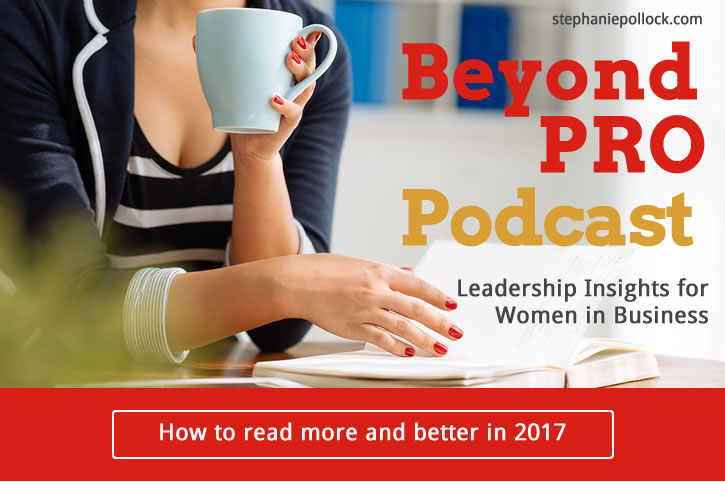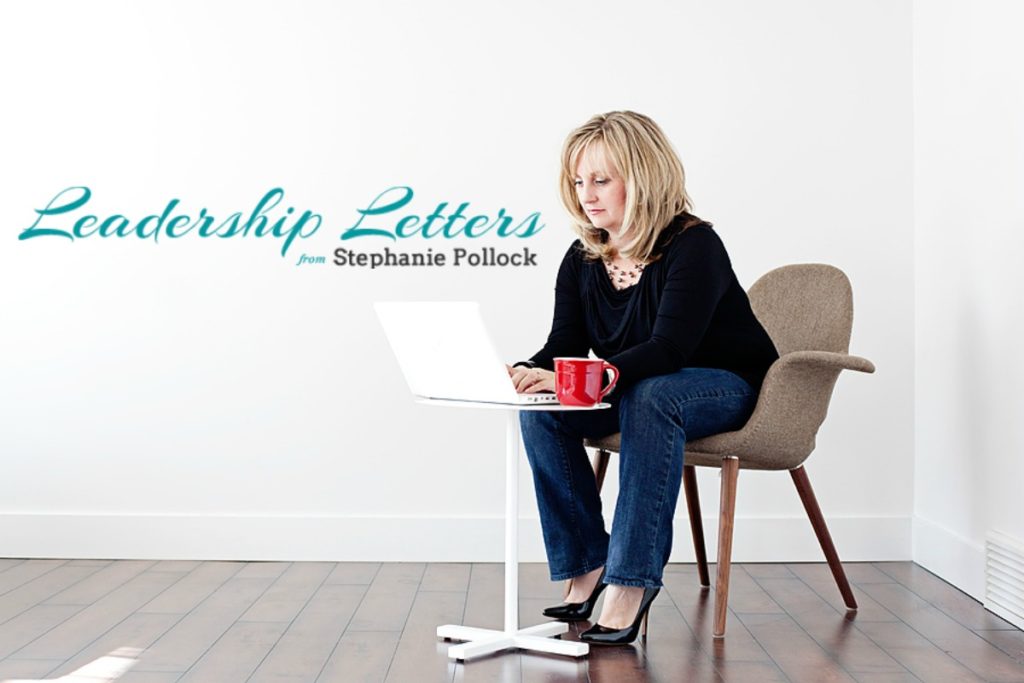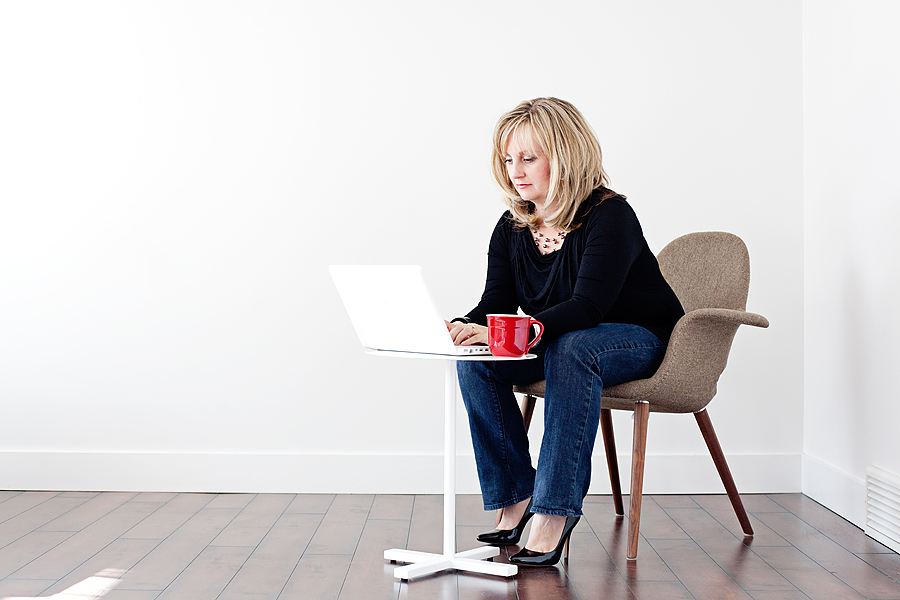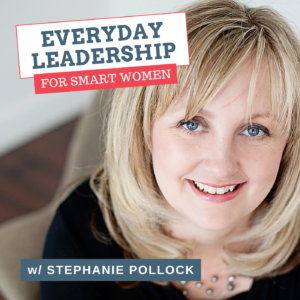Whenever you read a good book, somewhere in the world a door opens to allow in more light. —Vera Nazarian
Today’s episode is near and dear to my heart. I’ve been an active reader my entire life, minus a not-so-brief period when my kids were really young. My mom was a former teacher so books were always around. My husband’s father and step-mother are both retired librarians. Books have played a key role in who I’ve become. But over the years, as my available time to read diminished, I found it necessary to develop a more intentional reading practice.
In 2017, I’ve set a goal to read 52 books. This is an ambitious goal for me given the demands on my time, but with a few key lifestyle changes (e.g. not watching TV until bedtime), I can make it happen.
Listen to today’s episode to learn how you can read more and better this year.
FULL TRANSCRIPT:
Today’s episode is near and dear to my heart. I’ve been an active reader my entire life, minus a not-so-brief period when my kids were really young. My mom was a former teacher so books were always around. My husband’s father and step-mother are both retired librarians. Books have played a key role in who I’ve become. But over the years, as my available time to read diminished, I found it necessary to develop a more intentional reading practice.
In 2017, I’ve set a goal to read 52 books. This is an ambitious goal for me given the demands on my time, but with a few key lifestyle changes (e.g. not watching TV until bedtime), I can make it happen.
I’m also part of Modern Mrs. Darcy’s 2017 reading challenge. She’s got a Reading for Fun and Reading for Growth track, and I’ve signed up for the growth track which includes reading award-winning books, an immigrant story, three books by the same author, a book addressing current events and more.
This episode was largely inspired by a quick talk given by my friend Natalie Muyres at learning day for a program I’m part of. I’ve talked about on the podcast before, but I’m part of an alumni program through the Human Venture Institute. Reading is a critical component of our involvement, and the book list is longer than my lifetime.
Why leaders must be readers
Harry S. Truman once said –
“Not all readers are leaders, but all leaders are readers.”
So let’s talk about why we need to spend time reading. As entrepreneurs trying to juggle growing a business and managing our personal lives, do we really need to add reading to the mix?
Here are five reasons why:
Reading expands our perspective and makes us better thinkers
Reading helps us understand the world by broadening our perspectives through the voices of others. By engaging in different worldviews, we develop our thinking and analysis skills.
Reading ignites ideas
If you’re stuck for ideas, nothing will spark your brain like picking up a good book. And in my mind, it doesn’t matter whether it’s fiction or nonfiction. The pure act of engaging in other people’s ideas will surely spark your own.
Reading builds our expertise
Nothing will deepen your expertise as quickly as reading. The truth is that most people spend little to no time reading, so by picking up books in your field and then applying the learning, you’ve put yourself in a category above.
Reading develops our communication skills
Having strong communications skills are critical to any business leader. Whether it’s public speaking, writing, networking, sales or marketing, your business will grow as your communications skills grow. Reading expands your vocabulary, offers ideas for how to communicate well, inspires examples of great writing, and deepens your empathy which makes for better communications with those you serve.
Reading gives us an outlet to relax and be in the moment
As an entrepreneur, chances are good you work very hard. Reading is a great way to unwind and relax. Beyond crashing in front of the TV, reading offers a productive stress release.

What every business leader should read
While your book preferences will be highly personal, I do recommend that you look for ways to expand the breadth and depth of what you read. Drawing from only one source (e.g. business books or murder mysteries or health and wellness), however enjoyable, limits the scope of what you can learn and draw from.
I encourage you step outside your comfort zone and read from subject matter areas you normally wouldn’t. If you always read fiction, read some nonfiction. If you only read personal development books, pick up a book on politics.
In light of what’s happening in this new world of alternative facts and divisive social politics, I am making a concerted effort to read more from women and people of colour, so that I can better understand how they experience the world. Sarah Peck is doing this as well, and she links up to her reads on her website. I’ll post it in today’s show notes.
Where to find time to read in your overly packed schedule
So here’s the million dollar question I bet you’re asking yourself. Where do I find to read when my schedule is already packed to the brim? I get it. We lead incredibly busy lives, and adding another thing to the plate if you’re not already doing it, can feel daunting. And I know in the early stages of growing my business I felt like any time spent reading was time I should be hunting for clients or doing something to grow my business.
That shifted when I realized how integral my reading practice was with my ability to add value to my business and clients. Now, it’s a regular part of most days and I see it as necessary personal and professional development to sharpen my saw as Covey would say.
Back in December when Natalie gave her talk on reading, Ken, our fearless leader added this which I found particularly helpful to quell the overwhelm:
“I won’t get to all of the books that I have acquired, but the fact that they are there is encouraging”. Also, “I buy far more books than I can read, and read far more than I can systematically capture and digest – but once I have the book, I know it is there, it is a survey marker for my ignorance, and I can turn to it when I need to.”
Here are some really practical tips to get more reading minutes in. Find the ones that work with your life and interest:
- Read multiple books at a time: I like to have at least 2-3 books on the go at any given time. They are never from the same genre but allow me to read based on my moods. At any given time, you can find me with a business book, a fiction book and another nonfiction book exploring anything from current events to parenting to a memoir to history to personal development.
- Subscribe to Audible: Audiobooks have significantly increased my capacity to get more reading in. Every month I get a new credit for a book with Audible, and I can listen to these in the ‘in between’ moments of life or times when multi-tasking might actually work. I’ll listen to books while walking our dog Molly or washing dishes or sorting through papers. I particularly love Audible for non-fiction books read by the authors – especially if I am already familiar with the author. A few recent favourites include Trevor Noah’s new memoir, Born a Crime, Amy Poehler’s Yes, Please! Which I referenced in last week’s podcast episode, and Elizabeth Gilbert’s Big Magic. One pro tip: Increase the narration speed and you’ll get through the book even faster. It feels awkward at first, but you quickly adapt.
- Visit your local library: For many years, I bought most of my books. And I still do buy a lot of books, but over the past few years, I’ve started a regular library visit.
- Capitalize on the in between: I can be a bit of an all or none thinker when it comes to finding time for projects. Whether that’s making time to write, or in this case of finding more time to read, I default to thinking I need a decent chunk of time specifically carved out for those activities. But it’s not an all or none proposition, and there are many moments in our days that are the recipe to capitalize on a few extra minutes of reading. Whether it’s waiting in the carpool line with your Kindle in tow, or listening to an audiobook while you grocery shop, or sneaking just 15 minutes every night before bed, take advantage of the in-between moments and they’ll quickly add up.
- Schedule time to read: And finally, in contrast to my last point, do schedule the time to read. Be deliberate about creating time to develop yourself by identifying blocks in your days for reading. That might be part of a morning routine, or a bedtime ritual or somewhere else in the day. Bottom line: don’t hope you’ll find the time to read, make the time.
- Turn off the screens: If you have time to watch TV or scroll Facebook, you have time to read. Listen, I get we all need an escape and I’m the first person to go down the rabbit hole that is Facebook or turn on Netflix or my PVR’d Stephen Colbert, but it’s a slippery slope between one show and five shows. And for those of you with kids who want to encourage reading, the same thing applies. As one of my favourite childhood authors, Roald Dahl says in his poem “Television”…
So please, oh please, we beg, we pray,
Go throw your TV set away,
And in its place you can install
A lovely bookshelf on the wall.
Then fill the shelves with lots of books,
Ignoring all the dirty looks,
The screams and yells, the bites and kicks,
And children hitting you with sticks-
Fear not, because we promise you
That, in about a week or two
Of having nothing else to do,
They’ll now begin to feel the need
Of having something to read.
And once they start — oh boy, oh boy!
You watch the slowly growing joy
That fills their hearts. They’ll grow so keen
They’ll wonder what they’d ever seen
In that ridiculous machine,
That nauseating, foul, unclean,
Repulsive television screen!
And later, each and every kid
Will love you more for what you did.
Practical tips to extract the most value from your reading
As I mentioned at the beginning of the episode, this topic was inspired by Natalie’s talk at one of our learning days. With her permission, I’m sharing the suggestions she made to derive the greatest value and benefit from your reading. If you’re going to invest the time, you’ll want to be sure you get the most from it.
Here are her tips:
Practice: Read often, read daily, it takes practice to read well and build intellectual stamina.
Retain and integrate: It’s important to find an approach that works for you. Mark up and tab pages or write in the margins. I like to note my thoughts and links to other resources. Take note of what you’ve learned. I try to summarize chapters or a book in my own words to help me retain and to reference in the future.
Sidenote: I use Evernote to log my reading and insights. Steal my template over on the show notes page.
Read (yes read) the footnotes and references: There are always additional resources to support further inquiry in the footnotes and references.
While you’re reading ask yourself: What is the author reaching for? How are people making meaning from this and why? How is the author constructing their caring? How are they thinking? What are they drawing on?
Look for synergies between resources: Collect quotes in a journal, on note cards or in a digital tool to review and search for patterns. This will help integrate learning from across resources.
Build your own library and resource files: Engage in your own intellectual hunting. Explore an area you find interesting or your own field of endeavor. This includes books, videos, movies and articles.
Dictionary, thesaurus and search engines: Use these tools to understand statements or words that are not familiar to you. Do this each time until you read the statement or term and understand it in the context of the writing.
Don’t be a Garbage Bear: We use the metaphor of the ‘garbage bear’ as a way of reminding us to read with purpose. Bears will eat garbage, not paying attention to the value of the food they eat. They consume for the sake of consuming. This can be harmful. Like bears, we can be indiscriminate about what it is we consume or read. What we choose to read (or watch or engage in) shapes our understanding of life, it shapes our meaning making.
Finally, and this is something I’ve only recently put attention toward, is work hard to apply your learning to something specific in your business or life. Rather than just read something and say, “Hmmm. That’s interesting,” instead say, “Hmmm. That’s interesting. How could I apply or integrate that into my work now?” It might be fodder for a blog post, or a new program offer, or a way you could innovate or something else. But the important part is that you bring your reading to your real life. Now, naturally you won’t always be able to do that, but do try when you can.
If you’d like to dive deeper into this last point, I highly recommend the book Non-Obvious 2017: How to think different, curate ideas & predict the future.”
***
I hope I’ve inspired you to build more reading time into your year. If you’d like to follow along with my reading journey, I’ll be posting my completed books over on Instagram. I also posted my 2017 reading list below. You can find my Instagram handle here.
Have a wonderful day and I’ll catch you on the next episode.
Recommended Resources:
Listener Questions – submit your question for the show
My Evernote Book Notes Template – you can just save this to your Evernote
My 2017 Book List – (live Google Doc that I’ll update throughout the year)
Modern Mrs. Darcy 2017 Book Challenge
Human Venture Institute book list
Natalie Muyres post about reading
What should I read next? Podcast
Follow my book adventures on Instagram
Non-Obvious: How to think different, curate ideas & predict the future by Rohit Bhargava
Television – poem by Roald Dahl
2017 Book List – Sarah K Peck
Submit Your Question:
And as a reminder, please submit your questions for our new Listener Question episode each week. I’d love to help you navigate a tricky situation or unpack a challenge you’re facing in your business. To submit your question, click here. We’re just getting these organized and I’ll start airing them shortly. Given that this show focuses on business, leadership and personal effectiveness, please focus your questions here.
They can be thorny questions about a situation you’re dealing with that you’d like some feedback on (e.g. “how do I tell my business partner she needs to start pulling her weight?” or “I want to fire a client, but we’ve been working together forever and I don’t know how, any ideas?”) to general questions like, “What should I consider before I hire my first person?” or “My business model isn’t working for me, but I’m scared to change it. What should I do?”
I’ll offer ideas, insights, inquiries or advice depending on what’s most needed.
And to be clear, your question can remain relatively anonymous. I will refer to you only by your first name, unless you specifically state that you’d like me to share your business URL as well. So no worries about asking a question that feels a bit vulnerable.
I’d love your questions! Submit your question here.
Thanks for listening!
I want to thank you for listening and to those that have taken the time to review the show. If you like the Beyond PRO Podcast, please consider leaving an honest review in iTunes. Your review goes a long way to help this podcast get found by more people. Thank you!
You can review & rate the show here Beyond PRO Podcast
Here’s a recent review from Pepper Makepeace of the Small Business Sisterhood – be sure to check out her new podcast as well if you’re a new entrepreneur.
This podcast is a wonderful boost to my day! Stephanie is authentic, practical, and full of wisdom for entrepreneurs based on real-life experience. I’m a long-time follower of her work and am grateful for this podcast so I can hear her tips and insights on the go!





